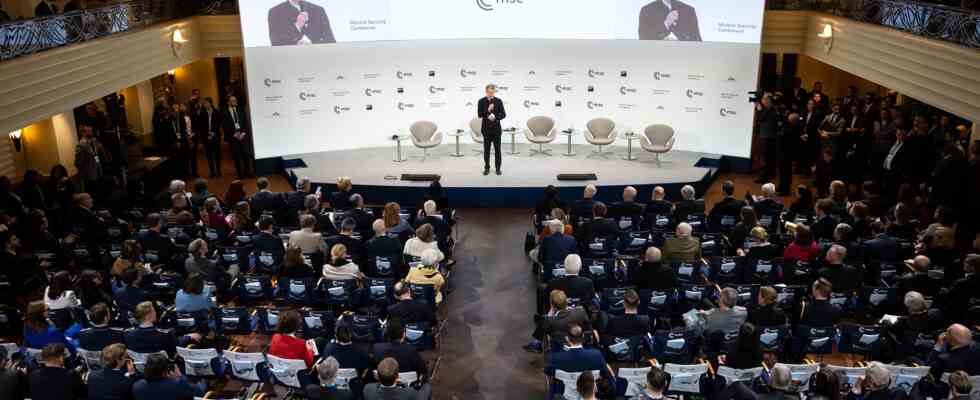Status: 02/19/2023 5:17 p.m
At the Munich Security Conference, the focus was clearly on the Russian war of aggression. Representatives of the armaments industry were sought-after discussion partners. It was about more ammunition, more weapons – but little about peace.
The results of the Munich conference include dashed hopes. Some had rested on the Chinese guest. The fact that Wang Yi, China’s chief foreign policy officer, made a special trip to Munich made some people wonder whether he might be able to build bridges to Moscow or exert his influence directly on Russian President Vladimir Putin – after all, he wanted to travel straight from Munich to Moscow. The hopes were dashed.
At no point did Wang indicate that he was critical of Russia’s war against Ukraine. “China has taken a very clear stance by agreeing on unlimited friendship,” and that a few days before the start of the war, Ursula von der Leyen recalled. “This means that China is very clearly on one side.” The President of the EU Commission herself had tried a number of things to get China on the side of the West, at least on the subject of sanctions. That had failed.
During the night, US Secretary of State Antony Blinken tried to strike up a conversation with the guest from China. On the fringes of the security conference, but with a similarly meager result. So meager that there was not even a joint statement afterwards. Blinken criticized the use of Chinese observation balloons over America, and the top Chinese diplomat called the launch a hysterical reaction.
Kallas: Not just Putin’s war
Unlike in previous years, this time the focus of attention at the Munich Security Conference was on the perspective of the Eastern Europeans because of the Russian war of aggression against Ukraine. The war is far from just Putin’s war, said Prime Minister Kaja Kallas. She took responsibility for the Russian people. “These are imperialist dreams that the Russians have,” Kallas said, stressing that she wasn’t just talking about Putin. “It’s the nation and I wonder what about the empire are they celebrating?” The West must “break the cycle”.
The cycle – by this the Estonian head of government means Moscow’s expansive course from the incorporation and suppression of the Baltic countries in Soviet times to the war against Ukraine. Even if Kallas’ idea of a collective guilt of the Russian people remained an individual thought, there was agreement at the security conference on the basic attitude towards the war and the consequences to be drawn from it.
The West must arm itself massively: This demand was heard again and again and in many languages in the Bayerischer Hof. Europe’s High Representative for Foreign Affairs and Security Policy, the Spaniard Josep Borrell, summed it up on the final day: “There is still a lot to be done. We must increase and speed up our military aid to Ukraine.”
Closing speech by Chairman Heusgen at this year’s security conference in Munich
tagesschau24 3:00 p.m., 19.2.2023
Sought-after interlocutors
More weapons and faster deliveries – there were hardly any voices in the Bayerischer Hof that openly opposed this objective. The insight shared by government representatives, members of parliament and security experts made the representatives of the armaments industry, who were also present, sought-after discussion partners.
Above all, they are supposed to deliver ammunition, it is urgently needed for replenishment. Ammunition depots in the West are also gradually emptying, as NATO Secretary General Jens Stoltenberg calculated last week. The gap between the ammunition being fired in Ukraine and the much smaller amounts currently being produced in Europe is widening, Stoltenberg said.
EU Commission chief von der Leyen announced help from Brussels. “We can use the same mechanism that we had with the vaccines,” said the CDU politician. A subsidy was given to the pharmaceutical companies in advance. Similar aid measures are also possible for the armaments industry. “We can also make advance payments so that the production lines are expanded and production and delivery are faster,” says von der Leyen.
Irritation about Ukrainian statements
Aid for the armaments industry from a European fund in which the member states are pooling – it’s still unclear what the capitals will think of it. The fact that the armaments industry is not in financial difficulties at the moment should play a role here. Many arms manufacturers achieved high profits in the war year. Rheinmetall, for example, was able to double its stock market value in one year.
The statements made by two members of the Ukrainian government caused irritation. Deputy Prime Minister Oleksandr Kubrakov and Foreign Minister Dmytro Kuleba said they could envisage the use of cluster munitions and phosphorus incendiary weapons. Both types of weapons are banned under international law, they lead to severe burns and poisoning. NATO Secretary General Stoltenberg’s reaction was brief and abrupt: “The Allies don’t supply weapons of this type.”
Nevertheless, Kuleba did not give up. Ukraine is not a party to the Convention Banning Cluster Munitions. “From a legal point of view, there are no obstacles to this,” he told the dpa news agency. “And when we get them, we will use them exclusively against the armed forces of the Russian Federation.” Ukraine has evidence that Russia is using cluster munitions.
MSC23 – More weight of Eastern Europeans
Helga Schmidt, WDR Brussels, February 19, 2023 3:55 p.m

